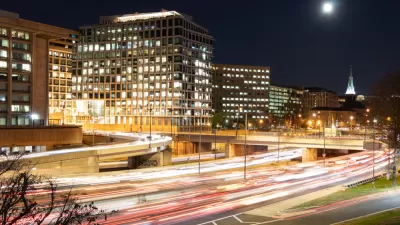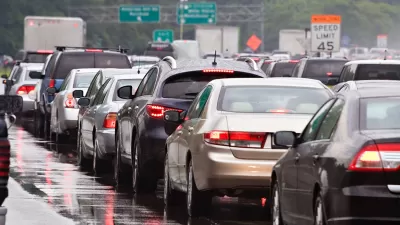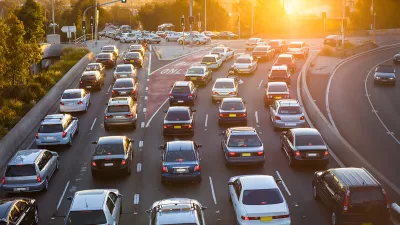Low transit ridership and a more dispersed daytime workforce are creating new headaches for car commuters in the D.C. area—in a story likely to be repeated all over the country as work returns to the office.

Since the beginning of the pandemic, prognosticators have pointed to the narrative about public health concerns and a new acceptance of telecommuting driving outward migration as a sign of congestion to come (Planetizen even mentioned congestion in its 2022 trends to watch post). With increasing numbers of workers returning to the office in recent weeks, it's time to check in again with the congestion beat.
Katherine Shaver reports for the Washington Post that traffic congestion has been getting notably worse in the D.C. area:
- "Morning traffic volumes on some arteries headed into downtown Washington grew, on average, by almost 9 percent between late February and early March, according to the District Department of Transportation."
- "Average morning speeds on northbound I-95 in Northern Virginia and part of the southbound Baltimore-Washington Parkway in Maryland have slowed from about 55 mph late last year to 46 mph, according to INRIX, a Seattle-area traffic analytics firm."
Shaver also provides the context for those congestion numbers by reporting other key factors:
- "Some commercial property managers report office buildings near 35 percent to 50 percent of pre-pandemic occupancies, while their parking garages are at 55 to 70 percent. Metrobus has hovered around 70 percent of pre-pandemic ridership for months. But Metrorail, whose customers generally have more opportunities to telework and drive, has lagged at about 30 percent this month."
As a final component of the congestion mix, Shaver reports: "Regional transportation planners say they are hearing that some carpools and van pools — most common among auto-dependent commuters from farther-out suburbs — haven’t reformed as trips to the office have become less regular."
The article includes soundbites from commuters who report their automobile commute experiences and share why they are choosing not to take transit when returning to the office after two years of working from home. The article provides a substantial debate from numerous sources about whether congestion and high gas prices might push some commuters to more efficient mode choices.
FULL STORY: As workers return to the office, experts see early signs of more driving

Maui's Vacation Rental Debate Turns Ugly
Verbal attacks, misinformation campaigns and fistfights plague a high-stakes debate to convert thousands of vacation rentals into long-term housing.

Planetizen Federal Action Tracker
A weekly monitor of how Trump’s orders and actions are impacting planners and planning in America.

San Francisco Suspends Traffic Calming Amidst Record Deaths
Citing “a challenging fiscal landscape,” the city will cease the program on the heels of 42 traffic deaths, including 24 pedestrians.

Defunct Pittsburgh Power Plant to Become Residential Tower
A decommissioned steam heat plant will be redeveloped into almost 100 affordable housing units.

Trump Prompts Restructuring of Transportation Research Board in “Unprecedented Overreach”
The TRB has eliminated more than half of its committees including those focused on climate, equity, and cities.

Amtrak Rolls Out New Orleans to Alabama “Mardi Gras” Train
The new service will operate morning and evening departures between Mobile and New Orleans.
Urban Design for Planners 1: Software Tools
This six-course series explores essential urban design concepts using open source software and equips planners with the tools they need to participate fully in the urban design process.
Planning for Universal Design
Learn the tools for implementing Universal Design in planning regulations.
Heyer Gruel & Associates PA
JM Goldson LLC
Custer County Colorado
City of Camden Redevelopment Agency
City of Astoria
Transportation Research & Education Center (TREC) at Portland State University
Jefferson Parish Government
Camden Redevelopment Agency
City of Claremont





























